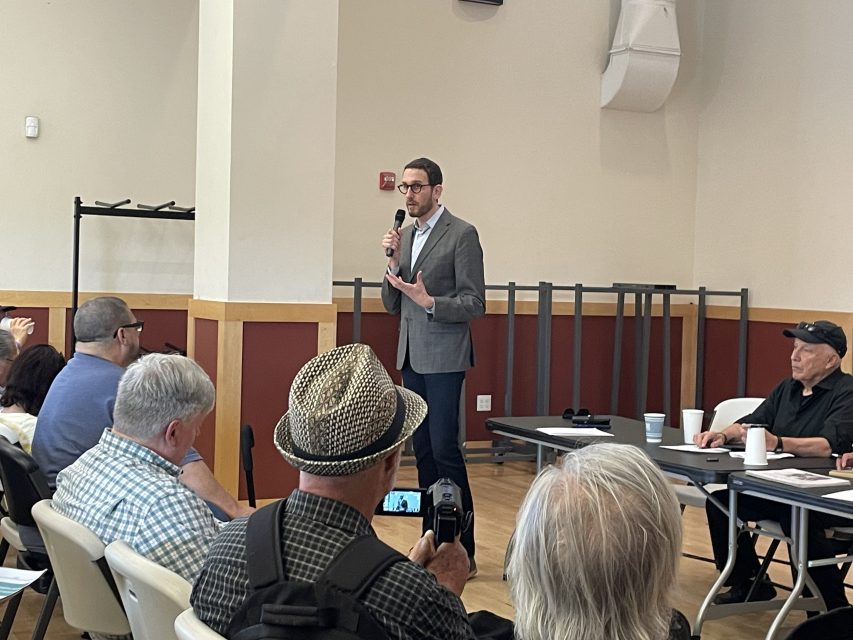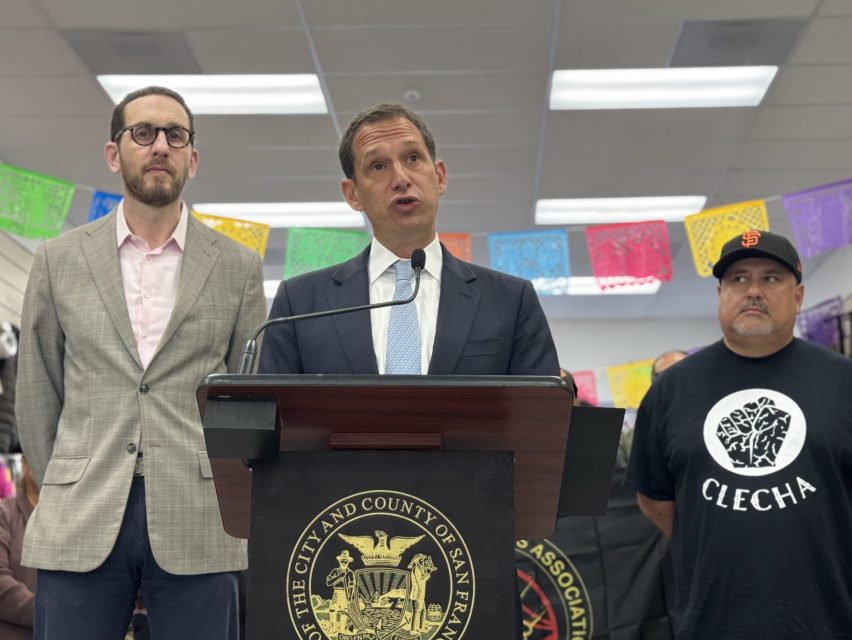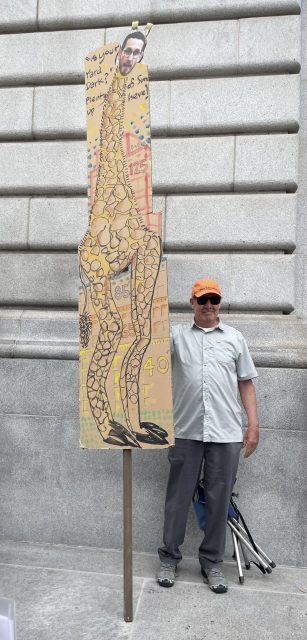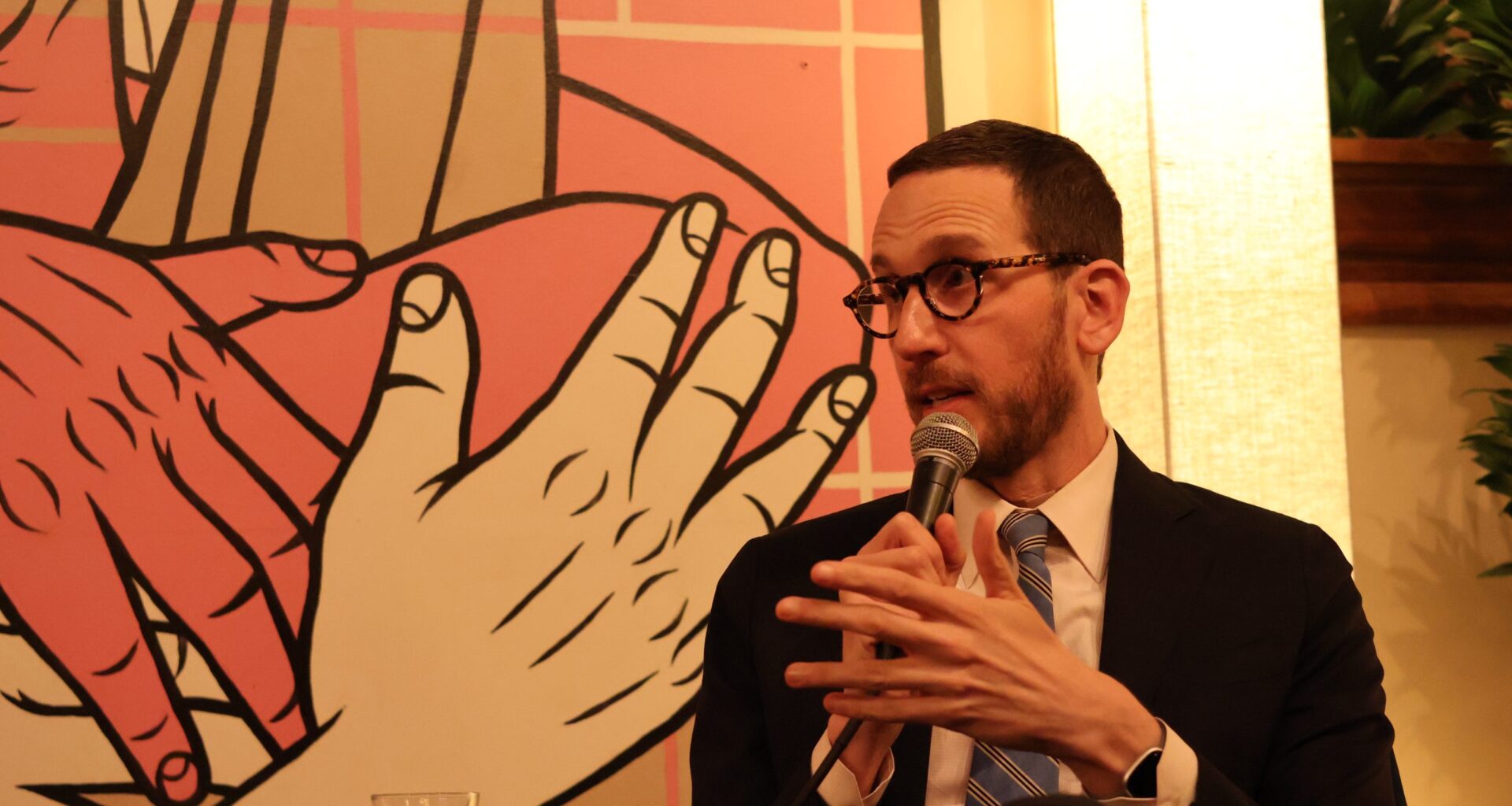Sen. Scott Wiener — 6-foot-7 with the physique of an exclamation mark — looks like many things. But not a bad guy wrestler.
And yet, of late, other San Francisco politicians have been more than happy to portray Wiener as the heel who’ll come flying off the top rope and bring the pain to this city in its latest political smackdown.
At forums in which concerned residents of the city’s lower-slung enclaves show up to vent about Mayor Daniel Lurie’s pending upzoning plan, San Francisco leaders’ responses seem to mirror the archetypal “Family Guy” joke: You think that’s bad?
Both Lurie and, later, Supervisor Stephen Sherrill last week told constituents that, whatever San Franciscans’ misgivings about the upzoning plan — You think that’s bad? — to scuttle it would be infinitely worse. Both warned their respective crowds that, if the city fails to properly upzone, the state of California will amble into town and kick us right in the ass.
And that, somewhat unsubtly, redirects the crowd’s fear and loathing to Wiener — the man who shod the state with a pair of steel-toed ass-kicking boots.
In his eight years in Sacramento, Wiener has passed numerous measures limiting local control over construction, enabling bigger and denser development and mandating municipalities to facilitate the production of more housing — or face the music.
Wiener is not a flatterer. He is remarkably consistent in his thinking and straightforward in his speech — for a regular person, let alone an elected official. He is hard-headed (if you don’t like him) or driven (if you do). To wit: For the better part of seven years, he attempted, Sisyphus-like, to roll a transit-oriented development bill into law that would rezone much of California in one fell swoop.
Finally, on Friday, Gov. Gavin Newsom signed SB 79. It was as if Sisyphus rolled his boulder all the way up the hill — and over anyone in the way.
So, when asked how he felt about other politicians claiming their hands are tied and rendering him the Darth Vader of upzoning, Wiener’s answer was unambiguous: “Oh, I don’t care.”
 Sen. Scott Wiener addresses a skeptical crowd regarding upzoning at the Sunset Recreation Center on Oct. 6, 2025. Photo by Io Yeh Gilman
Sen. Scott Wiener addresses a skeptical crowd regarding upzoning at the Sunset Recreation Center on Oct. 6, 2025. Photo by Io Yeh Gilman
Westside residents of District 4 on Sept. 16 recalled their supervisor, Wiener’s strong ally Joel Engardio, by a near supermajority. It was a stunning display — the margin far exceeded even the lopsided outcome predicted by the recall campaign. It was, perhaps, the apotheosis of the reductive populism that has become endemic in San Francisco and beyond in recent years.
On election night, Lurie — who had assiduously avoided making any public comments about the recall — put out a statement about how he’d heard “countless west side families say what San Franciscans have been feeling for years: that their government is doing things to them, not with them, and that government is not working to make their lives better.”
I’ll take “passive-aggressive and patronizing things to do” for $500, Alex. But that’s not the tack Wiener took. Wiener, again, is no flatterer.
At the moment of Engardio’s immolation by his own constituency, Wiener praised his ally as “a fantastic public servant.” Wiener portrayed the ouster of the district supervisor as the first domino to fall in a reactionary campaign to thwart the mayor’s upzoning plan and “stop new housing or any change whatsoever.” On the night a near supermajority of District 4 voters made their views resplendently clear, Wiener accused them of “freezing the city in amber” and acting to “deeply harm San Francisco and San Franciscans.”
Daniel Lurie is a novice politician. His statement was political. Wiener is a veteran politician. His statement was not. How this plays out for both Wiener and his city remains to be seen.
 Mayor Daniel Lurie, center, is joined by Sen. Scott Wiener, left, and William Ortiz Cartagena, right, founder of the Hispanic Chamber of Commerce on Tuesday Oct. 7, 2025. Photo by Oscar Palma.
Mayor Daniel Lurie, center, is joined by Sen. Scott Wiener, left, and William Ortiz Cartagena, right, founder of the Hispanic Chamber of Commerce on Tuesday Oct. 7, 2025. Photo by Oscar Palma.
Like a bar mitzvah for the elderly, you aren’t truly a septuagenarian San Francisco neighborhood dweller until you’ve spent an evening yelling at Scott Wiener in a recreation center social room.
“I have been in many community meetings over the years where people are pissed off and loaded for bear,” Wiener sums up. “When you start bullshitting voters, it’s bad — period. People are going to see it. Better just to be transparent. Over the years, I’ve had people say ‘I don’t agree with you but I also know you’re not bullshitting me.’”
And, over the years, enough people have voted for Wiener that he’s matriculated from the Democratic County Central Committee to the Board of Supervisors to state senate. He has been a stoker in the Democratic Party’s legislative engine room. And it is no secret that, when the time comes, he aspires to run for the once-in-a-generation Congressional seat held by Rep. Nancy Pelosi — provided she no longer wishes to fill it.
Even Wiener’s political enemies believe he’s sincere. Nobody questions his smarts and diligence, and more than one adversary independently labeled him a “true believer.” Regardless, being Mr. Upzoning may not be a boffo career move, especially on the Westside.
Mission Local obtained a June poll of 600 citywide voters. When recipients were asked if they were more or less likely to favor a generic proposal if it was backed by Wiener, the state senator was in the red: 34 percent of San Franciscans said they’d be less likely to support it, versus 29 percent who said they’d be more likely to do so.
On the Westside, it was more lopsided. In District 4, he was 23 points in the hole (16-39). In District 1 he was also 23 points underwater (20-43).
Those aren’t spectacular numbers. But it’s just one poll, the district results are small sample sizes and Wiener counters that he’s doing much better in his own polling. “My citywide numbers are strong. My numbers on the Westside are good — just not as strong,” he says. “That’s been true for me, always.”
But whatever one’s thoughts on development and upzoning, it’s hardly a surefire political winner. It’s also likely not the Fort Sumter of a populist revolt as the closing of the Great Highway turned out to be — at least not right away. That was tangible and quick. Upzoning is esoteric and buildings do not sprout overnight.
Should Pelosi run in 2026 and outpace her well-heeled progressive challenger, Saikat Chakrabarti, her next Congressional election would come in 2028. By then she would be 88 years old. This is, likely, Wiener’s time to make his bid for national office. But in three years, the effects of upzoning may be tangible, instead of theoretical. Voters — especially in the city’s lower-slung, tonier districts — may not be thrilled.
Unlike other politicians who surprised their constituents by closing highways or upzoning the city’s far-flung neighborhoods, nobody can say Wiener bullshitted them. But that doesn’t mean they owe him a vote.
 A counterprotestor with a giraffe sign at a rally in support of the upzoning plan at city hall on September 11, 2025. Photo by Io Yeh Gilman.
A counterprotestor with a giraffe sign at a rally in support of the upzoning plan at city hall on September 11, 2025. Photo by Io Yeh Gilman.
So, this is Scott Wiener’s bad-guy wrestler moment. But is he in trouble with the voters? Not necessarily. Other than that one Monty Python sketch, wrestlers don’t wrestle themselves. Bad guy wrestlers are vanquished by good guy wrestlers (most of the time).
How Wiener fares in a hypothetical future Congressional race depends upon who does — or does not — toss their hat in the ring. While Wiener’s stance on housing and development may turn off some voters, his stances on other matters — belittling Trump, unfailingly standing up for LGBTQ rights, transit advocacy — may win them back. He is a remarkably eclectic politician with work in areas to appeal to — or piss off — everyone.
So far, that ratio has been in his favor. For a decade and change, voters have scoured their ballots, asked themselves that fateful question — you think that’s bad? — and filled in the circle next to his name.
“People are complicated,” he says. “They are not monoliths.”
That includes politicians. At least some of them. Whether that’s a political benefit or detriment remains to be seen.

